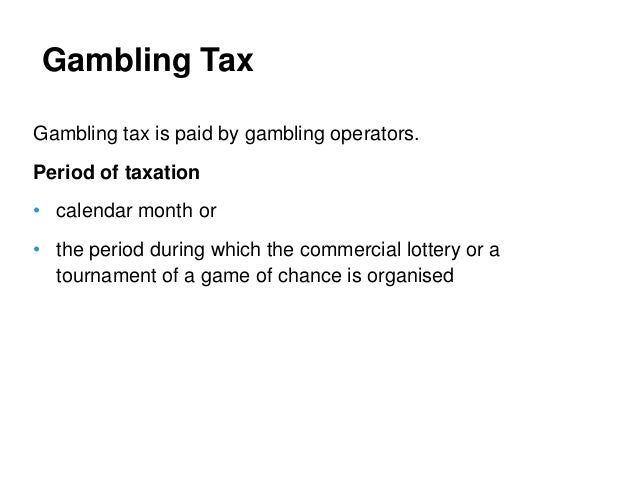Gambling Losses Tax Deduction 2019
Gamblers understand the concept of win some, lose some. But the IRS? It prefers exact numbers. Specifically, your tax return should reflect your total year’s gambling winnings – from the big blackjack score to the smaller fantasy football payout. That’s because you’re required to report each stroke of luck as taxable income — big or small, buddy or casino.
How much can I deduct in gambling losses? You can report as much as you lost in 2019, but you cannot deduct more than you won. And you can only do this if you’re itemizing your deductions. If you’re taking the standard deduction, you aren’t eligible to deduct your gambling losses, but you are still required to report all of your winnings. The Tax Cuts and Jobs Act of 2017 (TCJA) will have broad-ranging effects on all kinds of individuals. Taxpayers with a personal connection to gambling (i.e., recreational gamblers) or one in the form of a trade or business (i.e., professional gamblers) will find that the revisions to Internal Revenue Code (IRC) section 165(d) may have far-reaching consequences in the years before the. You are allowed to list your annual gambling losses as an itemized deduction on Schedule A of your tax return. If you lost as much as, or more than, you won during the year, you won't have to pay any tax on your winnings. Even if you lost more than you won, you may only deduct as much as you won during the year. 115–97, § 11050(a), inserted at end “For purposes of the preceding sentence, in the case of taxable years beginning after December 31, 2017, and before January 1, 2026, the term ‘losses from wagering transactions’ includes any deduction otherwise allowable under this chapter incurred in carrying on any wagering transaction.”.
If you itemize your deductions, you can offset your winnings by writing off your gambling losses.
It may sound complicated, but TaxAct will walk you through the entire process, start to finish. That way, you leave nothing on the table.
How much can I deduct in gambling losses?
You can report as much as you lost in 2019 , but you cannot deduct more than you won. And you can only do this if you’re itemizing your deductions. If you’re taking the standard deduction, you aren’t eligible to deduct your gambling losses, but you are still required to report all of your winnings.

Where do I file this on my tax forms?
Let’s say you took two trips to Vegas this year. In Trip A, you won $6,000 in poker. In the Trip B, you lost $8,000. You must list each individually, with the winnings noted on your return as taxable income and the loss as an itemized deduction in Schedule A. In this instance, you won’t owe tax on your winnings because your total loss is greater than your total win by $2,000. However, you do not get to deduct that net $2,000 loss, only the first $6,000.
Now, let’s flip those numbers. Say in Trip A, you won $8,000 in poker. In Trip B, you lost $6,000. You’ll report the $8,000 win on your return, the $6,000 loss deduction on Schedule A, and still owe taxes on the remaining $2,000 of your winnings.
What’s a W-2G? And should I have one?
A W-2G is an official withholding document; it’s typically issued by a casino or other professional gaming organization. You may receive a W-2G onsite when your payout is issued. Or, you may receive one in the mail after the fact. Gaming centers must issue W-2Gs by January 31. When they send yours, they also shoot a copy to the IRS, so don’t roll the dice: report those winnings as taxable income.
Don’t expect to get a W-2G for the $6 you won playing the Judge Judy slot machine. Withholding documents are triggered by amount of win and type of game played.
Expect to receive a W-2G tax form if you won:
- $1,200 or more on slots or bingo
- $1,500 or more on keno
- $5,000 or more in poker
- $600 or more on other games, but only if the payout is at least 300 times your wager
Tip: Withholding only applies to your net winnings, which is your payout minus your initial wager.
What kinds of records should I keep?
Keep a journal with lists, including: each place you’ve gambled; the day and time; who was with you; and how much you bet, won, and lost. You should also keep receipts, payout slips, wagering tickets, bank withdrawal records, and statements of actual winnings. You may also write off travel expenses associated with loss, so hang on to airfare receipts.


Use TaxAct to file your gambling wins and losses. We’ll help you find every advantage you’re owed – guaranteed.
Author
Do you roll the dice? Enjoy the slot machines? Even as a casual gambler, your winnings are fully taxable and must be reported on your tax return. Learn more about how the Tax Cuts and Jobs Act impacts gambling.
There are unique considerations when it comes to disclosing gambling wins and losses on your tax return….modified recently under the Tax Cuts and Jobs Act (TCJA). If you gamble, make sure you understand the tax consequences.
First off—what counts as gambling in the eyes of the IRS?
Gambling income includes (but is not limited to)

- Winnings from
- Lotteries
- Raffles
- Horse races
- Casinos
- Cash winnings
- Fair market value of prizes (like cars and trips)
The general rules
Wins
You are required to report 100% of gambling winnings as taxable income on your 1040. In addition, all complimentary offerings provided by casinos and gambling establishments must also be included in winnings. Winnings are subject to your federal income tax rate (though rates have been reduced under the TCJA-check out our blog, 2018 Tax Reform Provisions for Individuals for more on this).
Also, if you receive a certain amount of gambling winnings or if you have any winnings that are subject to federal tax withholding, the payer must issue you a Form W-2G “Certain Gambling Winnings”.
In other words, the payer is required to issue you a W-2 G if you receive (according to the IRS).
- $1,200 or more in gambling winnings from bingo or slot machines;
- $1,500 or more in proceeds (the amount of winnings minus the amount of the wager) from keno (a game of chance similar to lotto);
- More than $5,000 in winnings (reduced by the wager or buy-in) from a poker tournament;
- $600 or more in gambling winnings (except winnings from bingo, keno, slot machines, and poker tournaments) and the payout is at least 300 times the amount of the wager; or
- Any other gambling winnings subject to federal income tax withholding.
Losses
Gambling losses can be written off as miscellaneous itemized deductions. The gambling loss deduction is limited to the extent of your winnings for the year and excess losses cannot be carried forward to future years.
Under the TCJA, misc. deductions subject to the 2% of adjusted gross income floor are not allowed, however certain deductions (including the gambling loss deduction) are still deductible.
However, since the standard deduction for 2018 was nearly doubled by the TCJA, many taxpayers may no longer benefit from itemizing, seeing as itemizing saves tax only when the total itemized deductions exceed the applicable standard deduction.
How do you claim a deduction for gambling losses?
Recordkeeping is key!
To deduct gambling losses, you must document:
- The date and type of gambling activity
- The name and address of the gambling establishment
- The names of anyone who was present with you at the gambling establishment
- The amount won or lost
**You can document gambling on table games by recording the number of the table you played and retain statements showing casino credit issued to you. As far as lotteries go, you can use winning statements and unredeemed tickets as documentation.

Key takeaway
The TCJA adds limitations to the gambling loss deduction — you can now only deduct losses up to the amount of your winnings. Any excess loss cannot offset other highly taxed income. Thus, those in the trade or business of gambling, may no longer deduct non-wagering expenses, such as travel expenses or fees, to the extent those expenses exceed gambling gains.
Questions? Contact us.
The TCJA…So Many Changes, So Many Questions…we can help you navigate this huge tax overhaul! Visit our Tax Reform Center for everything you and your business need to know, now.
Gambling Losses Tax Deduction 2019 Irs
Newsletter
Get KLR updates delivered to your inbox.
Subscribe